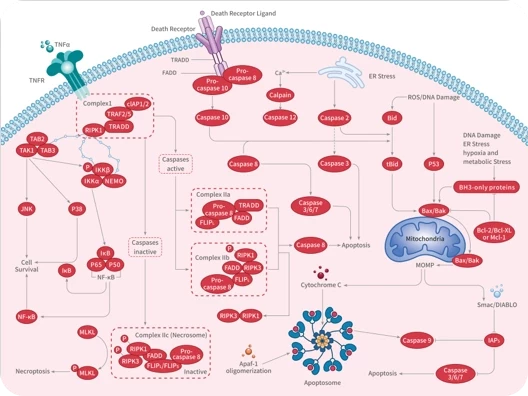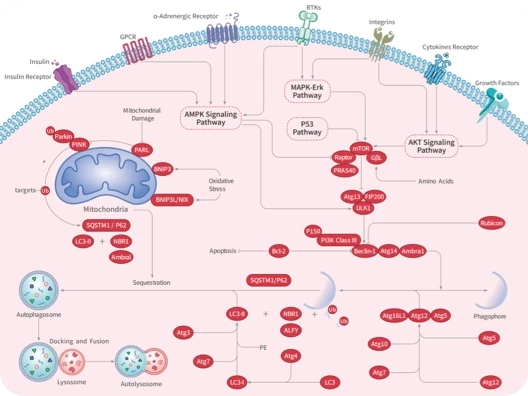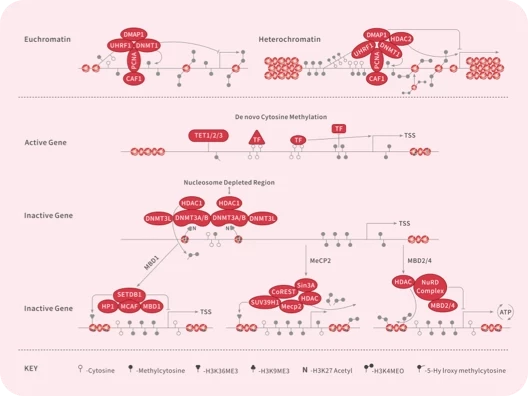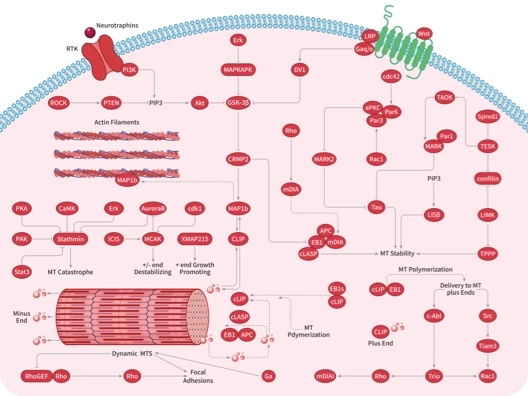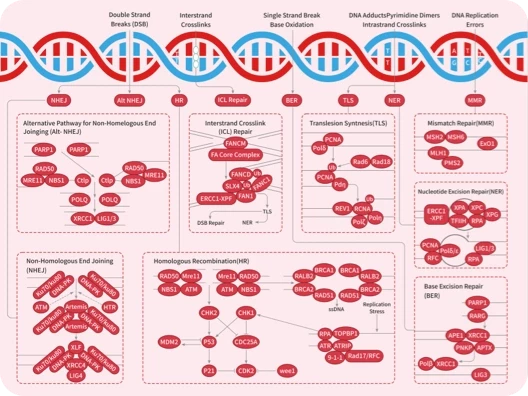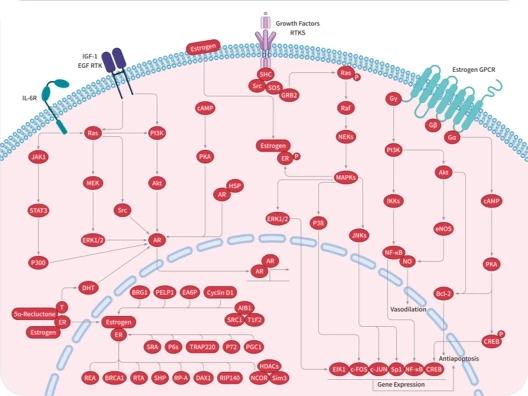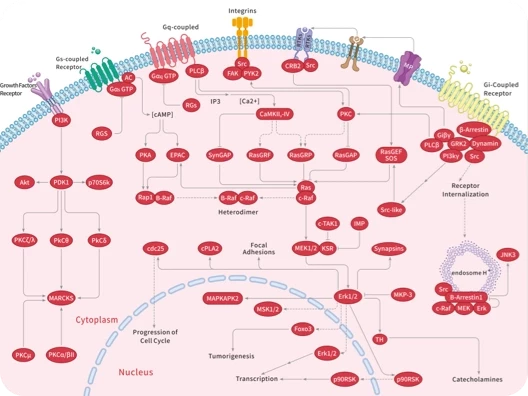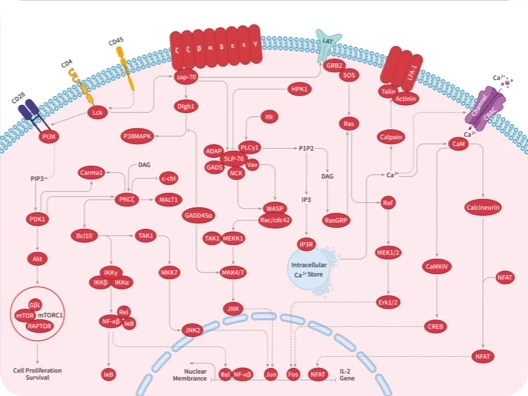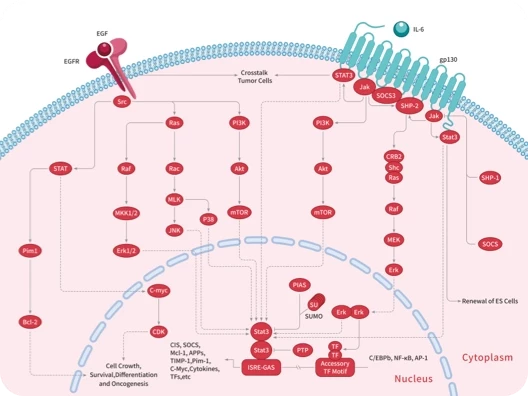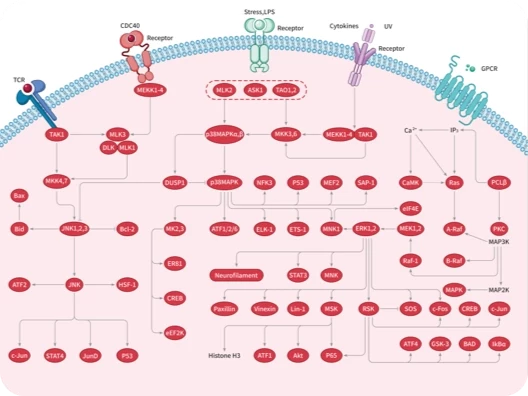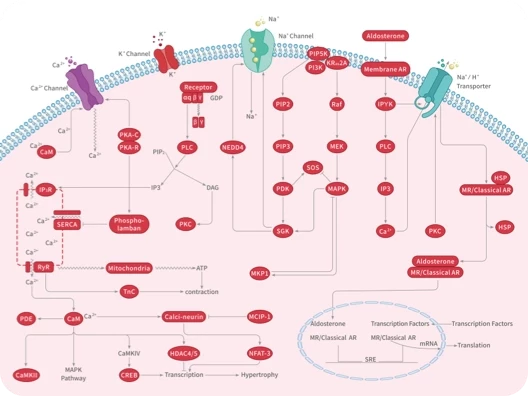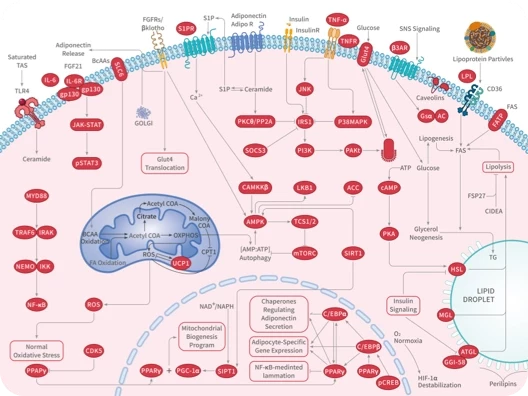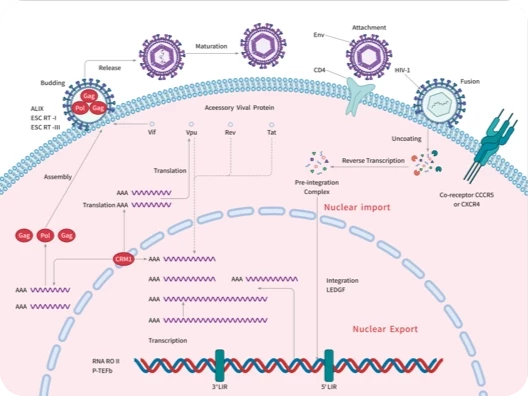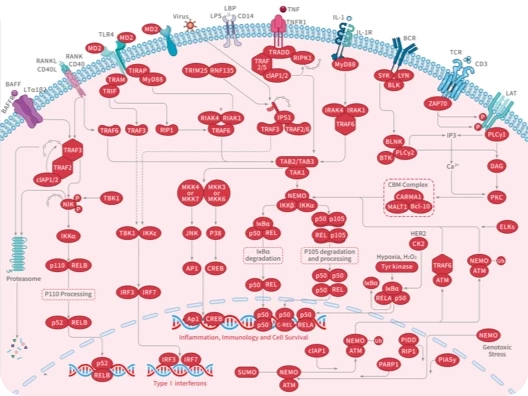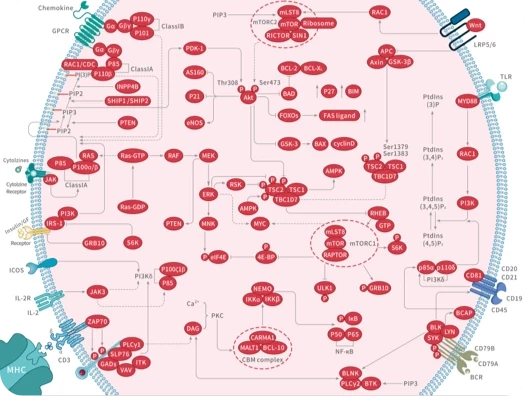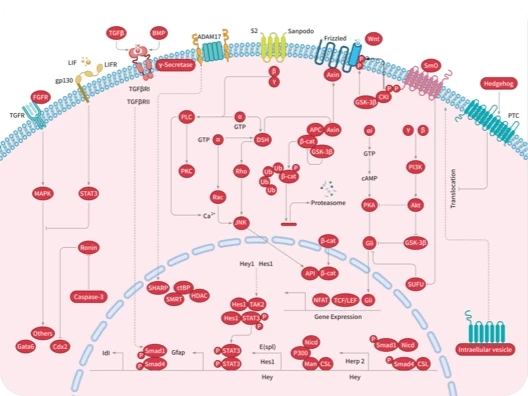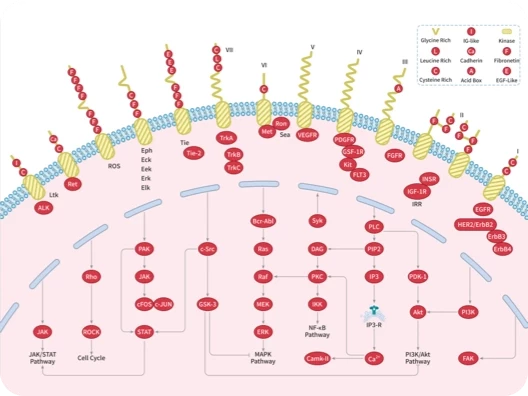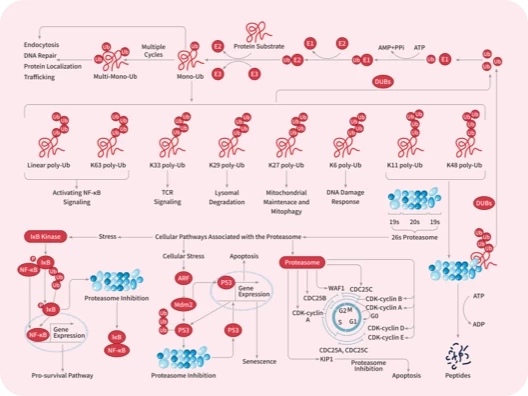- 全部删除
 您的购物车当前为空
您的购物车当前为空
购物车
云实属
(35)
兔尾草属
(2)
兵豆属
(1)
决明属
(19)
刀豆属
(1)
刺桐属
(23)
千斤拔属
(4)
厚果槐属
(1)
双蕊苏木属
(1)
大豆属
(25)
密花豆属
(1)
小槐花属
(1)
山扁豆属
(2)
山蚂蝗属
(1)
山豆根属
(1)
排钱草属
(1)
无忧花属
(1)
木豆属
(3)
染料木属
(1)
水黄皮属
(1)
油楠属
(2)
油麻藤属
(2)
海红豆属
(1)
牧豆树属
(2)
猪屎豆属
(5)
瓜儿豆属
(1)
甘草属
(48)
百脉根属
(4)
相思子属
(1)
相思树属
(3)
紫穗槐属
(2)
紫藤属
(2)
紫雀花属
(2)
羊蹄甲属
(1)
羽扇豆属
(7)
肿荚豆属
(1)
胡卢巴属
(2)
胡枝子属
(4)
芒柄花属
(1)
苜蓿属
(2)
苦参属
(36)
草木樨属
(1)
菜豆属
(1)
葛属
(24)
补骨脂属
(12)
豌豆属
(2)
车轴草属
(6)
野豌豆属
(2)
金雀儿属
(3)
银合欢属
(2)
锦鸡儿属
(2)
马鞍树属
(3)
鱼藤属
(21)
鸡血藤属
(5)
鹰嘴豆属
(1)
鹰爪豆属
(1)
黄檀属
(9)
黄芪属
(8)
甘草属
Semilicoisoflavone B
TN2201129280-33-7
Semilicoisoflavone B 是一种从光果甘蓝提取的异黄酮,具有抗癌活性,通过诱导 ROS 产生和下调 MAPK 和 Ras Raf MEK 信号传导来诱导口腔癌细胞凋亡。
- ¥ 1830
规格
数量
Magnesium isoglycyrrhizinate hydrate
TN7831658701-67-8
Magnesium isoglycyrrhizinate hydrate (18α-Glycyrrhizic acid Magnesium hydrate) 是一种可从甘草中提取的活性成分,具有抗炎活性,可降低丙氨酸和天冬氨酸氨基转移酶活性,可用于研究 HIV-1 感染。
- ¥ 330
规格
数量
Licoflavonol
TN186260197-60-6
Licoflavonol 是一种可从甘草中提取的黄酮类化合物,是鼠伤寒沙门氏菌血清型 3 型分泌系统抑制剂,通过抑制 β 位点 APP 裂解酶 1 (BACE1) 转录来抑制 Abeta 分泌。
- ¥ 1990
规格
数量
Licoisoflavone B
TN186466056-30-2
Licoisoflavone B 是一种来自 Glycyrrhiza uralensis Fisch 的异黄酮类化合物。Licoisoflavone B 抑制脂质过氧化,抑制人细胞色素 P450 酶(CYP2C8 和 CYP2C9)。
- ¥ 1490
规格
数量
Licoricesaponin A3
TN1865118325-22-7
Licoricesaponin A3 是从 Gymnostachyum febrifugum Benth. 中提取的一种萜类皂苷,对 5-LOX 受体具有较好的亲和力。
- ¥ 14500
规格
数量
Glyasperin D
TN1699142561-10-2
Glyasperin D 是一种从 Glycyrrhiza uralensis 的根中提取得到的类黄酮化合物,具有潜在的抗菌活性,抑制幽门螺杆菌。
- ¥ 3864
规格
数量
Glabranine
TN168941983-91-9
Glabranin has antimicrobial activity, it shows significant activities on DPPH free radical with the IC50 value of 240.20 ug ml. Glabranin or a derivative thereof could be used to stimulate hair growth. Glabranine exerts a dose-dependent inhibitory effect
- ¥ 2610
规格
数量
6-Prenylquercetin-3-methylether
TN3195151649-34-2
6-Prenylquercetin-3-methylether是一种天然产物,属于豆科甘草属,其产品编号为 TN3195,CAS号为 151649-34-2。6-Prenylquercetin-3-methylether可用作对照参考。
- ¥ 4420
规格
数量
Dehydroglyasperin D
TMA0291517885-72-2
Dehydroglyasperin D exhibits anticancer, anti-inflammatory, anti-obesity, antioxidant and anti-aldose reductase effects, it inhibits the proliferation of HT-29 human colorectal cancer cells through direct interaction with phosphatidylinositol 3-kinase; it also mediates suppression of both COX-2 expression and the MLK3 signalling pathway through direct binding and inhibition of MLK3. Dehydroglyasperin D shows strong ferric reducing activities and effectively scavenged DPPH, ABTS(+), and singlet oxygen radicals.
- ¥ 11700
规格
数量
Kanzonol C
TN1832151135-82-9
Kanzonol C has antimicrobial activity, it also shows potent PTP1B inhibitory activity (IC50 value of 0.31-0.97uM). Kanzonol C has chemopreventive activity,it shows the inhibition of matrix metalloproteinase (MMP)-2 secretion from brain tumor-derived glioblastoma cells.
- ¥ 5250
规格
数量
Isoangustone A
TN4263129280-34-8
Isoangustone A has antitumor activity, it can induce G1 cycle arrest in DU145 human prostate and 4T1 murine mammary cancer cells, it inhibits cell proliferation by targeting PI3K, MKK4, and MKK7 in human melanoma. Isoangustone A dampens mesangial sclerosis associated with inflammation in response to high glucose through hindering TGF-β and NF-κB signaling. Isoangustone A also shows strong ferric reducing activities and effectively scavenged DPPH, ABTS(+), and singlet oxygen radicals.
- ¥ 5500
规格
数量
Glyasperin A
TN4147142474-52-0
Glyasperin A has cytotoxic properties against P-388 cells, its IC50 values being 6.0 microM.
- ¥ 4040
规格
数量
Eicosanyl caffeate
TN392628593-90-0
Eicosanyl caffeate has anti-ulcer and moderate antioxidant properties, it exhibits potent elastase inhibitory activity, with the IC(50) value of 0.99 microg mL.
- ¥ 2380
规格
数量
1-Methoxyphaseollidin
TMA241865428-13-9
1-Methoxyphaseollidin exhibits anti-Helicobacter pylori activity against the CLAR and AMOX-resistant strain as well as four CLAR (AMOX)-sensitive strains. 1-Methoxyphaseollidin may show moderate cytotoxic activity against KB and L1210 cells. 1-Methoxyphaseollidin also shows inhibition of lysoPAF acetyltransferase activity.
- ¥ 15000
规格
数量
Dehydroglyasperin C
TN3806199331-35-6
Dehydroglyasperin C is a potent NAD(P)H:oxidoquinone reductase (NQO1) and phase 2 enzyme inducer. Dehydroglyasperin C possesses potent antioxidant, cancer chemopreventive, and neuroprotective activities, it has protective effects against chronic diseases
- ¥ 8740
规格
数量
Glyasperin C
TN4148142474-53-1
Glyasperin C acts as a partial estrogen antagonist, it shows tyrosinase inhibitory activity (IC (50) = 0.13 + - 0.01 microg mL), it could be a promising candidate in the design of skin-whitening agents. Glyasperin C shows potent anti-vancomycin-resistant
- ¥ 4370
规格
数量
Glyasperin F
TN4149145382-61-2
Glyasperin F has antinociceptive, and anti-inflammatory effects, it could inhibit NO production in RAW 264.7 macrophages to some extent. Glyasperin F displayed cytotoxic effects against the four tested cancer cell lines with IC50values below 85 μM.
- ¥ 9958
规格
数量
Glyurallin A
TN4151199331-36-7
Glyurallin A possesses an antigenotoxic effect against carcinogenic N-methyl-N-nitrosourea (MNU) for the first time, it is important to prevent DNA damage by N-nitrosamines for cancer chemoprevention.
- ¥ 18200
规格
数量
Uralsaponin D
TN52051262489-44-0
Uralsaponin D displayed the inhibition on the growth of cancer cells with IC50 at 18.3-41.6 μmol/L, it could significantly increase the cytotoxic activity after hydrolysis.
- 待询
规格
数量
Licoricone
T383151847-92-8
Licoricone exhibits anti-helicobacter pylori activity against the CLAR and AMOX-resistant strain as well as four CLAR (AMOX)-sensitive strains.
- ¥ 13900
规格
数量
Glabrene
TN169060008-03-9
Glabrene, Liquiritin apioside, neolicuroside, and 18α²-glycyrrhetic acid are the predominant phenolic derivatives partitioning at the interface and most likely the major contributors to the notable synergistic antioxidant activity when coupled with pea pr
- ¥ 6500
规格
数量
Lupalbigenin
TN188976754-24-0
Lupalbigenin sensitizes detachment-induced cell death in human lung cancer cell through down-regulation of pro-survival proteins.
- ¥ 5600
规格
数量
Glicoricone
TN4137161099-37-2
Glicoricone acts as a partial estrogen antagonist. Glicoricone inhibited the monoamine oxidase with the IC50 values of 6.0 x 10(-5)-1.4 x 10(-4) M.
- ¥ 6500
规格
数量
Licorisoflavan A
TN4437129314-37-0
Licorisoflavan A shows weak scavenging activity against superoxide anion radical, it and licoricidin have potential for the development of novel host-modulating strategies for the treatment of cytokine and or MMP-mediated disorders such as periodontitis.L
- ¥ 3710
规格
数量
Gancaonin M
TN4099129145-51-3
Gancaonin M is a natural product from Glycyrrhiza uralensis Fisch.
- ¥ 12000
规格
数量
Gancaonin G
TN4097126716-34-5
Gancaonin G shows antibacterial effects on the MRSA strains with MIC values of 16 microg ml, it also shows more moderate antibacterial activity against Streptococcus mutans.
- ¥ 3560
规格
数量
Glucoliquiritin
TN414593446-18-5
Glucoliquiritin 是一种天然产物,可用于生命科学领域的相关研究。其产品编号为 TN4145,CAS号为 93446-18-5。
- ¥ 3140
规格
数量
Gancaonin N
TN4100129145-52-4
Gancaonin N 是一种天然产物,可用于生命科学领域的相关研究。其产品编号为 TN4100,CAS号为 129145-52-4。
- ¥ 6080
规格
数量
4'-O-Methylcoumestrol
TN58831690-62-6
4'-O-Methylcoumestrol is a natural product from Glycyrrhiza pallidiflora Maxim.
- ¥ 3090
规格
数量
Uralenol
TN2288139163-15-8
Uralenol significantly shows the inhibitory activities against the PTP1B enzyme; it also shows inhibitory activities on mushroom tyrosinase using l-tyrosine as substrate( IC50 =49.5 μM). Uralenol shows potent anti-proliferation effects on ER-positive breast cancer MCF-7 cells in vitro.
- 待询
规格
数量
Glycyrin
TN170366056-18-6
Glycyrin, one of the main PPAR-gamma ligands of licorice, can significantly decrease the blood glucose levels of genetically diabetic KK-A(y) mice.
- ¥ 12000
规格
数量
Licoricidin
TN186730508-27-1
Licoricidin, is a potent anti-metastatic agent, which can markedly inhibit the metastatic and invasive capacity of malignant prostate cancer cells.
- ¥ 8575
规格
数量
Licoarylcoumarin
TN4433125709-31-1
Licoarylcoumarin is a strong inhibitor of adenosine 3',5'-cyclic monophosphate (cAMP) phosphodiesterase. Licoarylcoumarin has antibacterial effects on the VRE strains; it has anti-HIV activity, and it has inhibitory effects on xanthine oxidase.
- ¥ 5420
规格
数量
7,2',4'-Trihydroxy-5-methoxy-3-phenylcoumarin
TN58781092952-62-9
7,2',4'-Trihydroxy-5-methoxy-3-arylcoumarin shows activity in inhibiting prostate specific antigen (PSA) secreted from androgen dependent prostate cancer cell line, LNCaP cells.
- 待询
规格
数量
Licoricesaponin E2
TN4436119417-96-8
Licoricesaponin E2 displayed the inhibition on the growth of cancer cells with IC50 at 18.3-41.6 umol/L, it could significantly increase the cytotoxic activity after hydrolysis.
- ¥ 4940
规格
数量
Uralsaponin C
TN52041262326-46-4
Uralsaponin C shows the cytotoxic activity against the human cancer cell lines MGC-803, SW620, and SMMC-7721 with IC50 > 100 μmol/L.
- 待询
规格
数量
Docosyl caffeate
TN387928593-92-2
Docosyl caffeate shows moderate antioxidant activity in DPPH and ABTS scavenging assays, it also has significant anti-inflammation activity. Docosyl caffeate exhibits potent elastase inhibitory activity, with the IC50 value of 1.4 microg mL.
- ¥ 8300
规格
数量
(+/-)-Sigmoidin A
TN5020176046-04-1
Sigmoidin A has moderate antioxidant, antimicrobial and anti-inflammatory activity.
- 待询
规格
数量
Glepidotin B
TN413687440-56-0
Glepidotin B是一种天然产物,属于豆科甘草属,其产品编号为 TN4136,CAS号为 87440-56-0。Glepidotin B可用作对照参考。
- ¥ 3710
规格
数量
6,8-Diprenylorobol
TN130266777-70-6
6,8-Diprenylorobol possesses weaker anti-H. pylori activity, it may be a useful chemopreventive agent for peptic ulcer or gastric cancer in H. pylori-infected individuals.
- ¥ 3710
规格
数量
Gancaonin I
TN4098126716-36-7
Gancaonin I exhibits anti-BsFtsZ GTPase activities; it also shows significant inhibitory activity against B. subtilis, with a MIC value of 5 uM.
- ¥ 13200
规格
数量
Eurycarpin A
TN4043166547-20-2
Eurycarpin A是一种天然产物,属于豆科甘草属,其产品编号为 TN4043,CAS号为 166547-20-2。Eurycarpin A可用作对照参考。
- ¥ 14200
规格
数量
Glycyrrhiza flavonol A
TN4150197304-01-1
Glycyrrhiza flavonol A是一种天然产物,属于豆科甘草属,其产品编号为 TN4150,CAS号为 197304-01-1。Glycyrrhiza flavonol A可用作对照参考。
- 待询
规格
数量
Licopyranocoumarin
TN4435117038-80-9
Licopyranocoumarin could as a potent neuroprotective drug via markedly blocked MPP+-induced neuronal PC12D cell death and disappearance of mitochondrial membrane potential, which were mediated by JNK.
- ¥ 4560
规格
数量
Dihydrolicoisoflavone
TN3852164163-92-2
Dihydrolicoisoflavone A possesses weaker anti-H. pylori activity, it may be useful chemopreventive agents for peptic ulcer or gastric cancer in H. pylori-infected individuals.
- ¥ 4370
规格
数量
转到第1页
/ 1 页












